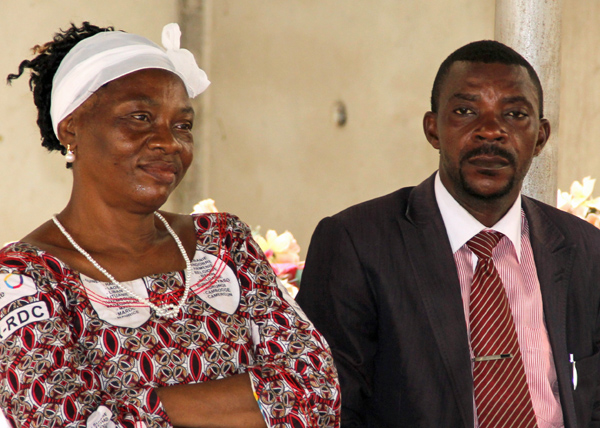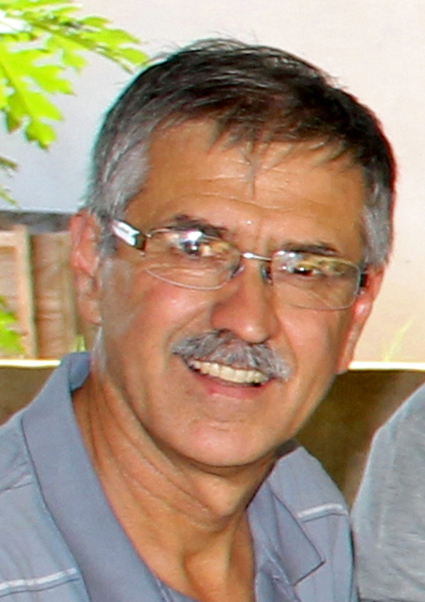Posted: October 21, 2014
Angola – “Come and visit us,” urged representatives of Angolan Mennonite churches during the May 2012 Mennonite World Conference (MWC) General Council meeting in Switzerland.
They said they felt isolated and abandoned following the end of Mennonite Central Committee (MCC) programming a decade ago, and after some leadership struggles in their churches.
The MWC Africa Caucus, together with Mennonite Central Committee, responded to the invitation with a visit 13-30 April 2013. (See related article about a September 2013 follow up visit arranged by the MWC Deacons Commission.)
The April visitors included Cisca Ibanda, chair of the MWC Africa Caucus and a member of the MWC Executive Committee and Bruno Baerg, area director for MCC Southern Africa. Also in the delegation were Sylvain Mupepe and Anne Yinda from Communauté des Églises des Frères Mennonites au Congo (Mennonite Brethren Church of Congo).
The delegation met with leaders of three national churches: Igreja da Comunidade Menonita em Angola (ICMA), Igreja Evangélica dos Irmãos Menonitas em Angola (IEIMA), and Igreja Evangelica Anabaptista em Angola (IEAA). ICMA and IEIMA are MWC members, IEAA has applied for membership. The leader of a third MWC member church, Igreja Evangélica Menonita em Angola (IEMA) did not participate in the meetings.
Collectively the four Angolan national churches have over 200 congregations and about 18,800 baptized members plus numerous adherents.
The delegation also met with different groups in the churches – deacons, women and youth ministries. In addition, they met with representatives of churches in conflict.
One of the challenges facing Angolan churches, reported the delegation, is the marginalization of former refugees (regressados) who fled to the Democratic Republic of Congo and other neighbouring countries during Angola’s long civil war (from 1975 to 2002) and then decided to go back home. Those who stayed in Angola and survived the war often refused to accept those who had fled and returned.
Many of the church members are regressados and do not speak the working language of Portuguese since they spoke French in DR Congo. Other challenges include overall poverty, lack of schools and teachers, high school fees and a literacy rate under 30%.
According to Baerg, MCC became involved in the late 1970s with support for Angolan refugees and later placed staff in Luanda, Angola’s capital, to teach English and to work with the Angola Council of Churches in peace and aid programs. In 2005 the MCC program in Angola was shut down, noted Baerg, “due to unavailability of personnel.”
When Angolan church leadership invited MCC to return to Angola, MCC decided it was best to engage the church through MWC to explore what an appropriate response might be to the Angolan request.
“One outcome of the April meetings,” said Baerg, “was an agreement that any request for assistance from the three national churches would come via the Inter-Mennonite Conference of Anabaptists in Angola (CIMA).” CIMA was set up in 2003, and needs further structuring, according to the delegation.
Baerg added, “Each of our meetings included welcome, embrace, joy and a celebration of the re-establishment of a lost relationship. Participants noted that for the churches, this was a new beginning.”
After their visit, the delegation recommended the need to reinforce the capacity of church staff to lead and manage church programs, resolve conflicts, implement Anabaptist and Mennonite values, raise the literacy of men and women and train women in income generating activities.
The delegation also recommended support for visits and exchanges by African and international groups and for Portuguese language courses to ensure the integration of members in the community.
“The Mennonite church of Angola,” concluded the delegation, “is a church with a future which deserves to be supported by MWC and other partners. It is a young, dynamic and vibrant church which has been impacted by the post-conflict environment…a church that needs our help in its evangelical and charitable mission.”
The delegation further concluded: “Its development depends in part on the guidance that we can provide to facilitate its progress and its integration into the family of Christian churches in Angola. In addition, the internal cohesion of the church and the socio-economic integration of its members will help the church become effectively self sufficient.”
News release by Ron Rempel
Cisca Ibanda (left) and Sylvian Mupepe at ICMA Centre in Luanda Bruno Baerg



Join the Conversation on Social Media
FacebookTwitterInstagramFlickrYouTube